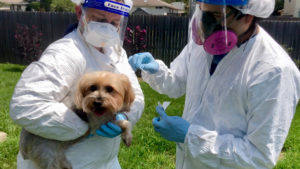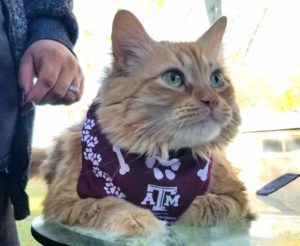Texas A&M research uncovers first known COVID-19 UK variant in animals
Dog, cat confirmed with COVID variant in Brazos County
The United Kingdom variant, B.1.17, of SARS-CoV-2, the virus that causes COVID-19, has been detected for the first time in a dog and a cat from the same household in Brazos County as part of a study led by researchers at Texas A&M University.

The first reported finding of the human variant virus in any animal worldwide, this detection of the UK variant in animals in a natural household setting reinforces the importance of having procedures in place to monitor the SARS-CoV-2 viral genome as it crosses species barriers. This would provide specialists with both insights and more time to study potential new variants before they spread through animal or human populations.
First detected in humans in the UK in December, B.1.1.7 spreads more easily and quickly than other variants and may be associated with an increased risk of death as compared to other forms of SARS-CoV-2. Since its first detection in humans in the U.S., also in December, this variant has now been confirmed in close to 4,000 people in the U.S. across 50 jurisdictions and is predicted to become the dominant viral strain in the U.S. in the coming months.
Pet discovery made during ongoing research
“Surveillance of SARS-CoV-2 in animals in and around households and genetic investigations of the virus from infected pets are critically important for understanding the transmission and evolution of the virus, as well as predicting what may happen next,” said Sarah Hamer, DVM, epidemiologist in the Texas A&M College of Veterinary Medicine and Biomedical Sciences.

Hamer serves as principal investigator for the “Texas A&M COVID-19 and Pets” study that uncovered the variant.
The B.1.1.7 variant was confirmed in both pets, a senior black lab-mix dog and a senior domestic shorthair cat. The pets were from a household where the owner was diagnosed with COVID-19 in mid-February.
Both pets were tested on Feb. 12, only two days after their owner was diagnosed with COVID-19, as part of an ongoing research project funded by the Centers for Disease Control and Prevention, which is being conducted by researchers in Texas A&M’s College of Veterinary Medicine and Biomedical Sciences, College of Agriculture and Life Sciences and School of Public Health.
Neither animal showed any overt sign of illness at the time of their positive tests.
These companion animals were retested March 11, at which time the owner disclosed that the dog and cat had both been sneezing over the past weeks; the owner is now reporting that both are in good health.
Whole genome sequencing results from the respiratory swabs collected from the animals last month were completed March 12 at the U.S. Department of Agriculture’s National Veterinary Services Laboratories. The result showed both the dog and cat had identical sequences of the B.1.1.7 variant.
The investigation into SARS-CoV-2 infections in people and pets in this household is ongoing.
Testing in Texas
Texas has long led the charts in the number of SARS-CoV-2 animal infections, owing in large part to the Texas A&M COVID-19 and Pets study. For the study, researchers go to the homes of people recently diagnosed with COVID-19 to test their pets.
The study’s goals are to learn more about transmission of SARS-CoV-2 between people and animals, the potential impact of the virus on animal health and whether animals may be a reservoir for the virus, i.e. maintaining it in communities.
“We look forward to continuing our study as the level of human vaccination increases to learn if our pets—which are unvaccinated—may continue to be involved in the virus transmission cycles, including the emerging variants,” Hamer said.
More than 450 animals living in the Brazos County area have been tested in the Texas A&M study since June 2020, all of which lived in a household where at least one human family member tested positive for COVID-19.
Of the more than 60 animals confirmed with SARS-CoV-2 infection in the study to date, less than a quarter were reported to show signs of disease around the time of the owner’s diagnosis. The most common signs include sneezing, coughing, diarrhea or being less active than normal. According to the research team, all symptomatic animals recovered without any need for veterinary care.
The viral genome sequences from the dog and cat infected with B.1.1.7 will be rapidly made available in a public database for use by the broader scientific community so that comparisons to other variants worldwide can be made.
What pet owners should know
“The work being done by Texas A&M University researchers highlights that pets can also get infected with variants of SARS-CoV-2,” said Casey Barton Behravesh, Ph.D., director of the CDC’s One Health office.
“Because this virus can spread between people and animals, it is important for people with COVID-19 to stay away from pets and other animals, just like they do for other people, while a person is sick in order to prevent the spread of this virus to animals.”
Based on the information available to date, the risk of pets spreading SARS-CoV-2 to people is considered to be low. SARS-CoV-2 spreads mainly from person to person through respiratory droplets from coughing, sneezing and talking.
People with suspected or confirmed COVID-19 should avoid contact with pets and other animals to protect them from infection and illness. If contact cannot be avoided, people with COVID-19 should wear a mask around pets and wash their hands before and after interacting with them.
At this time, routine animal testing for COVID-19 is not recommended, according to the Texas Animal Health Commission. If your pet is showing symptoms, consult with your veterinarian, who can assess your pet for common illnesses before looking into possible SARS-CoV-2 infection.
More about the study
The Texas A&M COVID-19 and Pets study is a collaboration among Texas A&M University, including Hamer and students from the College of Veterinary Medicine and Biomedical Sciences, Gabriel Hamer, Ph.D.; trainees from the College of Agriculture and Life Sciences; Rebecca Fischer, Ph.D., from the School of Public Health; the Brazos County Health Department; the Texas Department of State Health Services; the Texas Animal Health Commission; the CDC; the Wisconsin Veterinary Diagnostic Laboratory; and the U.S. Department of Agriculture National Veterinary Services Laboratory.
The project is ongoing. Those who have recently tested positive in the Brazos Valley region and would like to participate in the research by having their pets tested can learn more at BCS COVID Research. Participation in the research includes allowing the research team to collect swabs and blood samples from companion animals.
More information on keeping pets and people healthy during the pandemic is available on CDC’s COVID-19 website.
This story by Jennifer Gaunt originally appeared on the Texas A&M College of Veterinary Medicine & Biomedical Sciences website.


